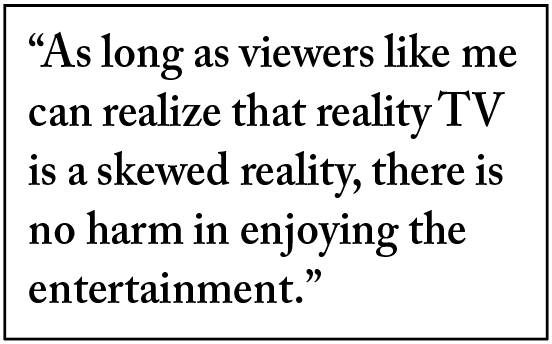Fact or fiction: The harmful nature of reality television

By Ally Ortolani
Opinion Editor
I’ll admit it, watching “Keeping Up with the Kardashians” is my guilty pleasure. I mean, who doesn’t love the outrageous shenanigans of the infamous Kardashian sisters? Kim’s crying face? Iconic.
Then there are other notorious shows like “Teen Mom 2,” “The Jersey Shore,” “The Bachelor” and “The Bachelorette,” “The Real Housewives of New Jersey” — the list goes on. These days, producers are willing to turn anything into an hour-long, weekly series.
During quarantine, my mom and I would watch “90-Day Fiancé” together. Personally, we were rooting for Rose from the Philippines — an obvious choice for both of us. And without giving anything away, let’s just say there was a lot of drama.
Needless to say, reality television is a source of entertainment for many individuals like myself — even if I don’t want to admit it.
However, it should be questioned whether the behavior displayed on these series displays and/or promotes dangerous, toxic behaviors for a mass audience.
Let’s talk about the infamous “Teen Mom 2” on MTV. It is undoubtedly difficult raising a baby while completing high school. However, the notorious series arguably encourages teen pregnancy by giving teen moms their own show. Paying teens to star in a show about their pregnancy? What message does the show send, especially with teenagers watching the show?
Whether it’s “Teen Mom 2” or “Keeping Up with the Kardashians,” the purpose of these shows is to feature scandals and highlight drama so that viewers — like myself — remain interested. The situations and drama featured on these series shouldn’t be used as examples for audiences to follow.
When you really sit down and examine the facts at hand, channels like E!, MTV and Bravo feature many TV series that portray messages, behaviors and attitudes that can have a negative influence on younger audiences.
“Jersey Shore” is yet another controversial series — my mother wouldn’t let me watch it when I was a teenager. Honestly, I don’t blame her.
However, despite its quick rise to fame, “Jersey Shore” received much criticism.
“UNICO, the largest Italian American service organization in the United States, referred to the show as a ‘direct, deliberate and disgraceful attack on Italian Americans,’” according to a February 2020 Hollywood Insider article.
Chris Christie, former Governor of New Jersey, also mentioned that the show was “bad for New Jersey” because it portrayed the Italian culture in a negative light and made the state look bad.
Then again, its viewership received record numbers at the time. However, I’m sure the combative behavior of the stars didn’t do the stereotype any favors whatsoever.
Even if these shows portray negative messages and display a false reality, it doesn’t mean audiences will stop watching. A good first step is being cognizant that one can watch a certain show and disagree with the content and/or the message.
Let’s use the Kardashians as an example. More specifically, when Kim Kardashian lost her $75,000 diamond earrings in the ocean in Bora Bora.
Although the earrings were worth $75,000, the rest of the Kardashian clan wasn’t able to understand why Kim was so upset about losing it. To many individuals, this amount of money is life-changing. I’m sure it’s a chunk of some students’ college tuition funds.
Kim is depicted as being overly dramatic for crying over her lost jewelry. Frankly, I don’t blame her. Imagine everything $75,000 could buy. Regardless, the Kardashian family is very much out-of-touch with the rest of the world. But that doesn’t mean I’m going to stop watching the show.
Reality TV is by no means actual reality. As long as viewers like me can realize that reality TV is a skewed reality, there is no harm in enjoying the entertainment. Or perhaps that’s just me.